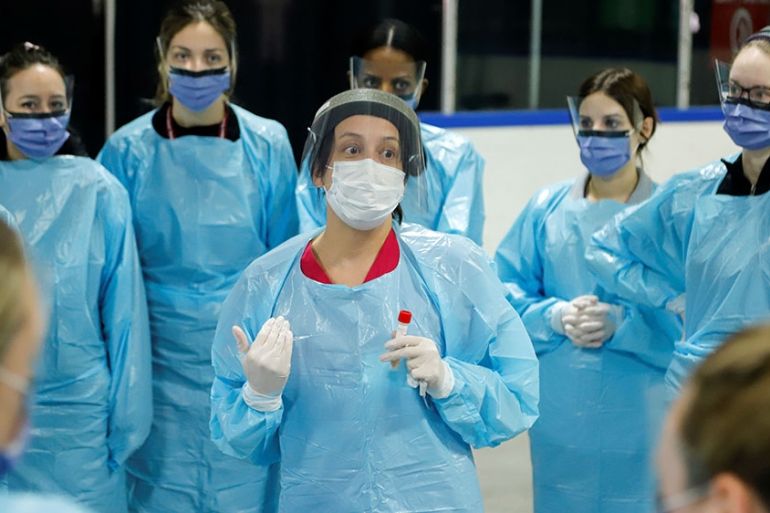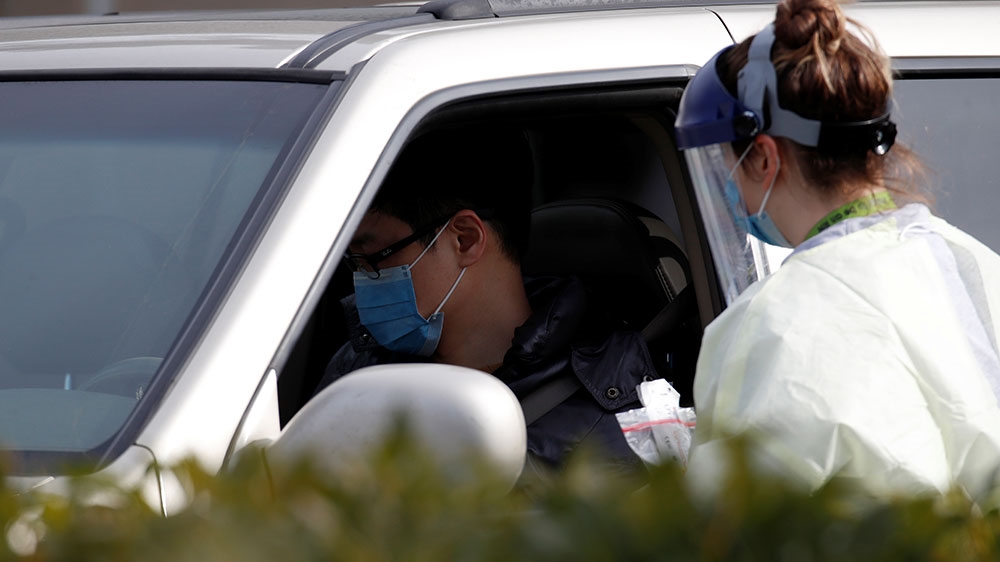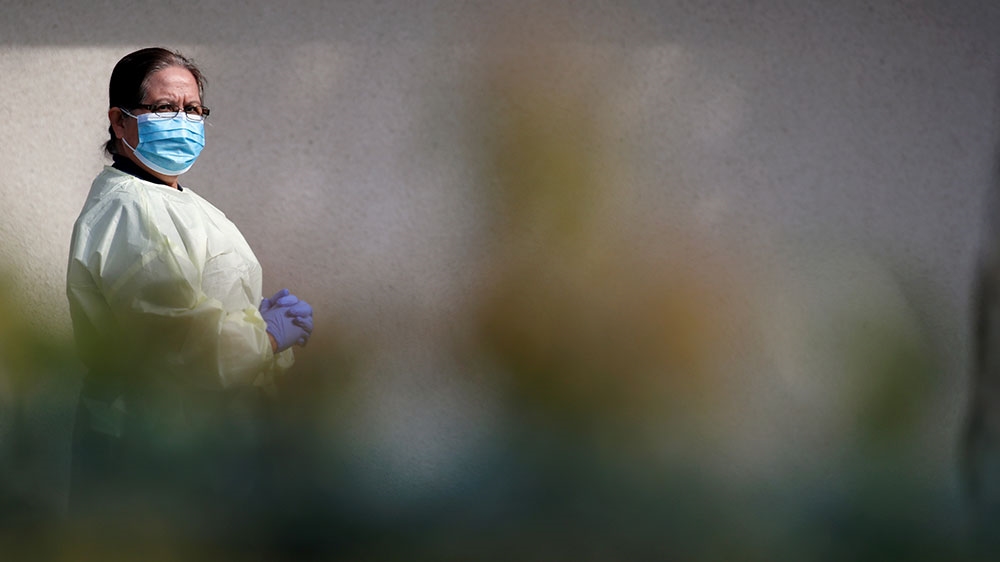Healthcare workers in Canada ‘mentally prepare’ for coronavirus
Mental health concerns extend to healthcare professionals on the front line of the fight against the novel coronavirus.

Montreal, Canada – It is like the feeling you get just before a rollercoaster makes it first drop, said Dr Nadia Alam, of preparing for a surge in cases of the novel coronavirus.
“It’s that moment where you’re breathless and just before you get that sick stomach feeling – where you know something big is about to happen,” said Alam, a family doctor in Georgetown, Ontario, a town about 60km (37 miles) west of downtown Toronto.
Keep reading
list of 3 itemsYour coronavirus emergency kit: Five workouts to do at home
What happens if you catch the new coronavirus?
The number of cases of COVID-19, the disease caused by the new coronavirus, is steadily increasing in Canada as more tests are carried out – and physicians, nurses and other healthcare professionals are gauging how ready they are to respond, Alam told Al Jazeera. Do they have enough supplies and hospital beds? What will they do if, and when, they run out?
“Every country that has been hit by the coronavirus has had its health system quickly overwhelmed,” said Alam, who works at a local clinic and a hospital that she said was already running above 100 percent capacity during Canada’s winter.
“A lot of us are just mentally preparing ourselves for the decisions we’re going to have to make over the coming weeks – and to do our best by the families and the patients that we take care of.”

Healthcare workers have been thrust into the heart of the global COVID-19 pandemic: More than 351,000 cases have been confirmed across over 160 countries, and hospitals and clinics are being stretched to their limits.
In China, where the coronavirus was first detected, thousands of healthcare workers were exposed to the virus, and dozens have died. A similar issue is emerging in Italy, where healthcare workers accounted for more than 8 percent of confirmed cases, according to a recent report. On March 18, Milan-based anesthesiologist Marco Pavesi wrote: “None of us have ever experienced a tragedy like it.”
Medical staff are working gruelling hours to treat COVID-19 patients and others needing care in trying conditions. In some places, supplies of medical masks, gloves and other protective gear are rapidly dwindling – adding another layer of risk for workers.
In places such as Canada and the United States, where the number of COVID-19 patients is expected to peak in the coming weeks, healthcare workers are waiting for their turn in the eye of the storm – a wait, and reality, that is having a tremendous effect on their mental health.
Varied stressors
Dr Caroline Gerin-Lajoie, executive vice president of physician health and wellness at the Canadian Medical Association (CMA), said that while healthcare workers are trained to deal with crises, the COVID-19 pandemic presents some unique challenges.
“We are facing a crisis that is at a level that we’ve not seen in many, many years,” she said, adding that the repercussions also may last for several months. Healthcare workers are dealing with many stressors, from fears they may contract the virus and infect their families, to concerns they may run out of personal protective gear or will have to ration supplies to treat patients.
“What is also unique is the level of uncertainty and rapid change that is affecting society, but also, in particular, the healthcare sector on a day-to-day basis,” Gerin-Lajoie told Al Jazeera. “The way we usually work in healthcare is now flipped upside down, and we are having to look at innovative ways to continue providing the best healthcare that we can at this particular time to our patients.”

The Ontario Nurses’ Association, which represents 68,000 registered nurses and healthcare professionals, said some of their members are concerned that personal protective equipment is not readily available in their workplaces. “As we learned all too well during SARS, without clear scientific evidence about transmission, every precaution must be taken to protect all front-line nurses and healthcare workers,” the group’s president, Vicki McKenna, said in a statement on March 13.
The Toronto Star newspaper reported on March 22 that at least 13 healthcare workers had tested positive for the coronavirus in Toronto alone.
Gerin-Lajoie said the CMA has called for the Canadian federal government to establish a national mental health hotline that workers can call to get support amid the pandemic. “In order to take care of other people, you must take care of yourself first,” she said, urging healthcare professionals to use the mental health resources that are available to them.
“The risk in this situation is that it may be prolonged so people will be stretching themselves out physically and psychologically over a longer period of time – and that’s why we need to be supportive of one another.”
Thousands volunteer
Despite those challenges, thousands of healthcare professionals across Canada have put their names forward to help respond to the pandemic. As of March 22, 1,465 COVID-19 cases had been confirmed, and at least 21 people had died countrywide from the virus, according to Johns Hopkins University.
Quebec, Ontario, Nova Scotia, British Columbia and other provinces have called on retired nurses, healthcare professionals who are on leave or work part-time and medical trainees to help, while the federal Public Health Agency of Canada asked for applications from nurses able to conduct health assessments, provide advice and communicate directives, among other duties.
Suzanne Henderson, a registered nurse who works part-time at a palliative care centre in Ontario, said she felt compelled to put her name forward to help despite some initial hesitation.
“You sort of have this feeling that you need to protect yourself and your family first and foremost, especially when you have little kids,” she told Al Jazeera, “but the more I thought about it, the more I realised that I’m in this profession to help other people, and this is the time to help other people.”

Henderson began answering calls for the public health agency last week, assessing people over the phone to see if they fit the criteria for COVID-19 testing. She said that some callers were asking about symptoms, while others had concerns about travel restrictions or whether they should go into work.
“It feels a lot like people are calling because they’re scared. And so a lot of it is talking to people and reassuring [them] and making sure that they’re heard, that their fears are heard and validated because it is a scary time for a lot of people,” she said.
She added that people should call the hotline if they’re not sure, but urged that they should be patient and follow instructions from public health officials. “We have a lot of calls coming in, and there can be wait times, but we’re doing the best we can with what we have.”
Community support
Steven Taylor, a clinical psychologist and professor in the department of psychiatry at the University of British Columbia on Canada’s west coast, said the public has an important role to play in keeping healthcare workers safe – and by extension, responding efficiently to the pandemic.
“We also need the public to help the healthcare workers do their jobs, and the public can do that by not overburdening the healthcare system,” he said.
Taylor told Al Jazeera that it is also important for healthcare professionals to feel they have support from their communities. Offering to do groceries for a nurse who is spending long hours at a hospital, for example, would go a long way.
I say that this COVID-19 is our generation's war effort. This is the time to pull together. This is the time to look after one another.
“What happened in SARS which was disturbing was that healthcare workers who worked with SARS patients were shunned and avoided by people in their community because people were frightened that they were infected,” he said. “They’re helping the community; the community should reach out and acknowledge that support and express their support for healthcare workers.”
Alam, the family doctor in Ontario, agreed.
“This is going to be a real test of our healthcare system, and our solidarity to be able to face this thing,” she said. “I say that this COVID-19 is our generation’s war effort. This is the time to pull together. This is the time to look after one another.”